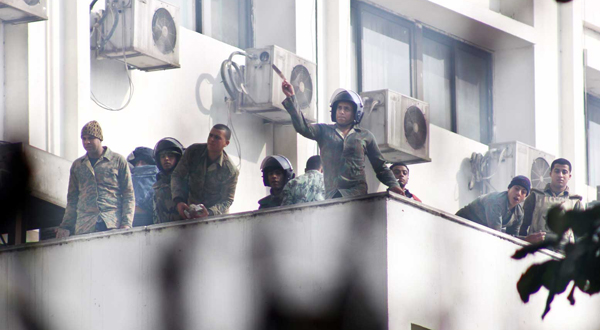
Cairo has once again erupted in chaos in and around Tahrir as security forces under the Supreme Council of the Armed Forces (SCAF) sent troops to clear the "Occupy Cabinet" protests early Friday morning. Although the Egyptian Ministry of Health reports 99 wounded at the time of writing, activists in and around the cabinet building report approximately 160 wounded protesters being treated in makeshift field hospitals, ten of whom were apparently hit with live fire. Despite ministry denials, the Egyptian human rights activist and blogger Nawara Negm reported five casualties on her Twitter feed. In light of the alleged poisoning of the Occupy Cabinet protesters yesterday, many believe that SCAF ordered the attack today as part of a premeditated and coordinated effort to remove the remaining demonstrators from the cabinet building and Tahrir. In response to the violence, protesters have once again returned to the area. Although more people are joining the stand-off by the hour, nearly two thousand are currently facing the lines of military soldiers blocking access to the cabinet on Qasr al-Aini street.
The Occupy Cabinet protest began with the appointment of Kamal Ganzouri over 2 weeks ago, calling for the SCAF to transfer executive authority to a civilian body immediately. Since then, April 6th Youth Movement activists have been setting up tents and collecting donations of food and blankets outside of the Council of Minister building, vowing not to leave until the demands of the Egyptian people are fulfilled. Yesterday, activists had to rush nearly 80 individuals to hospitals after eating donated "hawawshi" sandwiches. The clashes began less than 24 hours later after soldiers grabbed Abboudi Ibrahim, a young activist taking part in the cabinet sit-in, for trying to retrieve a football from the parliament’s garden. They arrested him, beat him, then released him to enraged protesters and friends. Amateur video released online shows him unable to walk, bleeding, both eyes swollen closed with his head wrapped in gauze.
Soldiers also arrested a group of four young female activists whom they dragged into the cabinet compound for a beating before turning them loose.
Protesters responded by throwing rocks at security officers, who in turn raided the street tearing down and burning protesters’ tents, throwing rocks back from nearby rooftops, and taunting the demonstrators. The clash escalated into a full scale raid on the protesters some of whom were arrested and the rest pushed to Qasr al-Aini street. Security forces have offered no statement on the numbers arrested or those who remain in custody, but activists claim that soldiers have detained dozens.
The latest violence erupted just as the second round of elections came to a close. Activists believe that the relative success of the elections and the resulting increase in public support has inflated the military’s ego and willingness to use a heavy-handed approach to sideline protesters, deemed no more than a nuisance with little public support. State television continues to accuse activists of provoking the unrest, defaming them with scapegoat labels such as "foreign instigators" and "paid thugs."
The SCAF either seems unable or unwilling to take action to stop the violence on Qasr al-Aini. The utter lack of leadership has prompted Ziad Aly, Moez Abdel Fattah, and Ahmed Khairy to offer their resignations from SCAF’s newly appointed advisory council with calls for the remaining members to resign. Presidential candidates have also joined in the calls for action. Mohamed ElBaradei said that "anyone who remains on the advisory council shares in the responsibility for today’s violence." Amr Moussa also called the violence unacceptable and demanded a full investigation. While the direction that this latest outbreak of violence will take depends on how the SCAF chooses to handle it, the lack of leadership and professionalism on the part of security officers and their superiors points to a terrible lack of coordination and command authority that could have deeper and more dangerous implications.
Tarek Radwan is an Egyptian human rights activist specializing in international law and conflict resolution. He has worked for Human Rights Watch’s MENA division and the United Nations mission (UNAMID) in Darfur as a Human Rights Officer. He currently provides consulting services on civilian protection and Middle East issues.
Photo Credit: The Daily News Egypt
Image: army-throw.jpg
